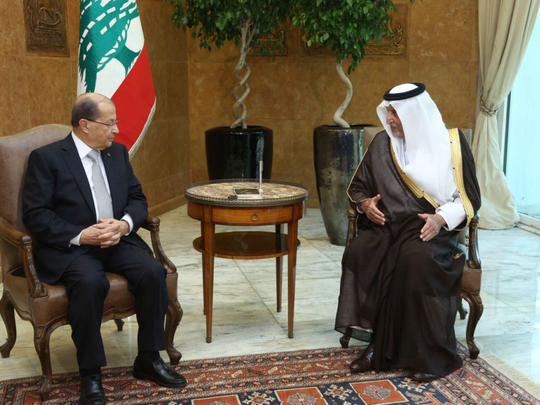
Beirut: Saudi Arabia has invited the newly elected Lebanese president to visit the kingdom.
Prince Khalid Al Faisal told reporters Monday after meeting President Michel Aoun at Baabda Palace near Beirut that the president has accepted the invitation and agreed to visit after a new Cabinet is formed in Lebanon.
Aoun was elected last month after a 29-month vacuum in the country’s top post. Lebanon’s political factions are deeply divided, with some, like Aoun’s Christian party and the Hezbollah militant group, aligning with Iran and their opponents siding with Saudi Arabia.
In February, Saudi Arabia halted a $3 billion (Dh11 billion) arms deal with Lebanon, a decision linked to the kingdom’s tensions with Iran. Iran and Hezbollah support Syrian President Bashar Assad, while Saudi Arabia backs the rebels trying to topple him.
Lebanon’s prime minister-designate Saad Hariri meanwhile said on Monday his efforts to form a new government faced “stumbling blocks”, casting doubt on hopes for the quick formation of a new administration to steer the country away from political crisis.
Hariri was designated prime minister more than two weeks ago as part of a political deal that saw Aoun fill the presidency that had been vacant for 2 1/2 years due to political divisions.
Optimistic statements from rival politicians had given rise to hopes the new cabinet would be in office in time for Lebanese independence day, which falls on Tuesday.
But casting doubt on how quickly the government would be formed, Hariri said “there are some stumbling blocks” after meeting Aoun on Monday. “There is someone complicating matters,” he said, without saying who.
Tensions have arisen among rival leaders over portfolio distribution, the number of ministries in the new cabinet, and a contentious electoral law which needs to be passed in order for a parliamentary election to happen in 2017.
Lebanon urgently needs effective government to address long-pending economic and development issues such as improving infrastructure, organising refuse disposal, and tapping offshore oil and gas reserves.
Political tensions, exacerbated by war in neighbouring Syria, have paralysed decision-making, and raised fears for Lebanon’s stability. The country has had no parliamentary election since 2009.











